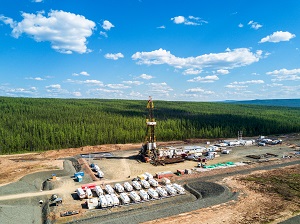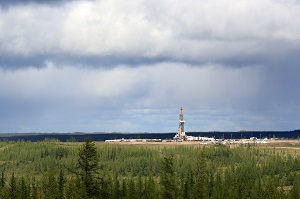Please activate JavaScript in your browser to use all interface options.
World Climate Change Day Celebrated on May 15
14 May 2021
On May 15, the international community celebrates World Climate Change Day. The initiative aims to raise awareness of climate change issues that affect the well-being not only of the present generation but also of the future one.
Rosneft Oil Company shares and actively supports international and national climate change goals. In line with the UN’s sustainable development climate change goals, the Company is perfecting its carbon management and implementing projects aimed at improving energy efficiency and rational use of associated petroleum gas (APG).
The first climate targets were set in 2017 as part of the Rosneft-2022 Strategy. The Company has consistently expanded its carbon agenda and developed a corporate carbon management approach in 2019, defining the vision, plans and key steps in this direction.
Rosneft was the first Russian oil and gas company to announce climate targets through 2035 as part of its Carbon Management Plan. The document stipulates the reduction of greenhouse gas emissions by 20 million tonnes of CO2, a 30% reduction in the emission intensity of oil and gas production, achieving a methane emission intensity below 0.25% and zero routine flaring of associated gas by 2035.
Rosneft Oil Company’s 2035 Carbon Management Plan takes into account the stance of the Company’s key shareholders and underpins Rosneft’s environmental agenda in terms of low-carbon economic development, including managing climate risks and identifying opportunities related to future energy demand.
 The Company has a Carbon Management Committee, reporting directly to Rosneft’s Chief Executive Officer. The committee consists of key senior managers and heads of business units whose activities affect the achievement of greenhouse gas emission reduction goals.
The Company has a Carbon Management Committee, reporting directly to Rosneft’s Chief Executive Officer. The committee consists of key senior managers and heads of business units whose activities affect the achievement of greenhouse gas emission reduction goals.
Rosneft pays special attention to programmes aimed at energy saving and rational use of APG, the implementation of which is a key factor influencing the reduction of greenhouse gas emissions. The Company achieved energy savings of 396,000 tonnes of CO2 equivalent in 2020 through the effective implementation of its Energy Saving Programme. High gains in energy efficiency have resulted in the mitigation of some 4 million tonnes of CO2 equivalent of greenhouse gas emissions over the past three years.
In addition, the Company is actively implementing projects in the area of rational utilisation of associated petroleum gas. In 2020, Rosneft completed the construction of 21 APG utilisations facilities, including gas injection, power generation, gas treatment and utilisation, and gas transportation infrastructure. For instance, a 50.5 MW gas turbine power plant was completed at Taas-Yuryakh Neftegazodobycha in 2020. The Company’s total capital investment in the construction of gas infrastructure facilities amounted to some 17.3 billion roubles in 2020.
Since 2019, Rosneft has been participating in the initiative of the world’s leading oil and gas companies titled “The Guidelines for Methane Emission Reduction in Natural Gas Supply Chain.” Over the last three years, fugitive methane emission reductions in the Upstream segment amounted to 236,000 tonnes.
 A landmark event for Rosneft is ‑the launch of the Vostok Oil project, which involves the development of the world’s largest oil and gas province in northern Russia. The Company intends to implement this low-carbon footprint project at only 25% of the traditional rates typical of global greenfield projects. This level will be achieved through the rational use of associated petroleum gas, the creation of year-round wind power generation and a high-quality resource base.
A landmark event for Rosneft is ‑the launch of the Vostok Oil project, which involves the development of the world’s largest oil and gas province in northern Russia. The Company intends to implement this low-carbon footprint project at only 25% of the traditional rates typical of global greenfield projects. This level will be achieved through the rational use of associated petroleum gas, the creation of year-round wind power generation and a high-quality resource base.
Rosneft changes the production structure as well in favour of more ecologically clean products, increasing gas production and its stake in the total output. In 2020, the share of gas exceeded 20% of the Company’s total hydrocarbon output.
Rosneft is constantly improving the characteristics of its motor fuels and expanding the geography of its supplies. In 2020, the Company continued to increase the number of filling stations selling new fuels with improved environmental characteristics, such as high-octane fuel Pulsar 100, Euro 6 fuel based on AI-95, as well as a line of fuels with ACTIVE technology at BP filling stations. Rosneft is also developing a compressed natural gas filling station programme and equipping its filling stations with charging infrastructure for electric vehicles.
Raising the level of environmental culture is a key priority of the Company’s human resources policy. Over 15 awareness sessions for managers and employees from various departments of the Company’s Central Administration Office and Group Companies were held as part of the Carbon Management Plan activities. Starting in 2021, such sessions are offered as corporate training on a permanent basis. The Company’s relevant specialists were trained in the course “Greenhouse Gas Emissions Accounting, Monitoring and Reporting System Associated with Regulatory and Methodological Requirements under ISO 14064 Standards”.
Rosneft
Information Division
May 14, 2021

-315xx70.png)

